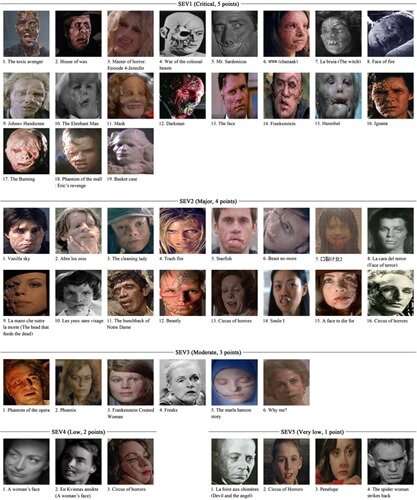This article has been reviewed according to Science X's editorial process and policies. Editors have highlighted the following attributes while ensuring the content's credibility:
fact-checked
trusted source
proofread
Plastic surgery goes to the movies: Study looks at perceptions of facial disfigurement

Characters with facial disfigurement have long been a recurring theme in films. Their characteristics and outcomes lend insights into perceptions of facial deformities and the effects of plastic surgery, reports a study in The Journal of Craniofacial Surgery .
Movie characters who undergo successful plastic surgery to improve their facial appearance are more likely to have happy endings, according to the new research by Young Suk Kim, BA, and Kun Hwang, MD, Ph.D., of Armed Forces Capital Hospital, Gyeonggi-do, Korea. They believe their findings relate to the cultural meanings of facial disfigurement, as well as to the psychological benefits of facial plastic surgery.
Film analysis shows negative associations with facial disfigurement
The researchers searched movie databases—IMDb (Internet Movie Database) and TMDB (The Movie Database)—to identify modern visual media depicting characters with disfigured faces. The analysis included 48 characters from 45 films directly related to the theme of facial disfiguration. While most films were from the United States, countries around the world were represented.
The movies were produced between the 1930s to the 2020s, with the highest proportion (20%) from the 1980s. Nearly three-fourths of characters were rated as being in the most severe categories of facial disfigurement. Examples of films with characters having "critical" facial disfigurement included "The Elephant Man" and "Mask."
About 80% of disfigured characters were viewed as negative, described by terms such as demonic, villainous, or violent. Just 20% were described positively—for example, hero or human.
"This seems to implicitly reflect the creators' biased view that presents disfigured faces in a negative light," the researchers write. After adjustment for other factors, society's perceptions of disfigured faces were not related to their effect on personality. Rather, the authors suggest, "a negative personality was formed due to psychological atrophy and self-esteem problems, not the disfigured face itself."
Surgery to improve facial appearance linked to happy endings
In the films, 35% of characters underwent surgery in an attempt to overcome their facial disfigurement. Other types of attempts included masks or magic. The attempts improved the character's facial appearance in about 70% of cases, including 94% of those who underwent surgery. Characters who underwent surgery were 56 times more likely to improve than those who tried other treatments.
Overall, 67% of characters had fortunate or happy endings, while the rest had misfortunate endings. Characters whose appearance improved were more likely to have happy endings: nearly eight times more likely than those who did not improve. The researchers add, "It is notable that some characters experienced misfortune even though their facial damage improved, while others became happy without improvement."
The authors discuss their findings in the context of the cultural and psychological meanings of facial disfigurement. The association between successful surgery and happy endings for characters with facial disfigurement is consistent with evidence on the positive psychological effects of plastic surgery for disfigured individuals.
Despite its many risks and side effects, "there is no doubt that facial plastic surgery enhances overall well-being and self-confidence," the researchers conclude. "The results of this film analysis study, which showed plastic surgery can improve the face and improve quality of life, can be seen as realistic and statistically significant."
More information: Young Suk Kim et al, Disfigured Faces Depicted in Modern Visual Media, Journal of Craniofacial Surgery (2023). DOI: 10.1097/SCS.0000000000009456



















